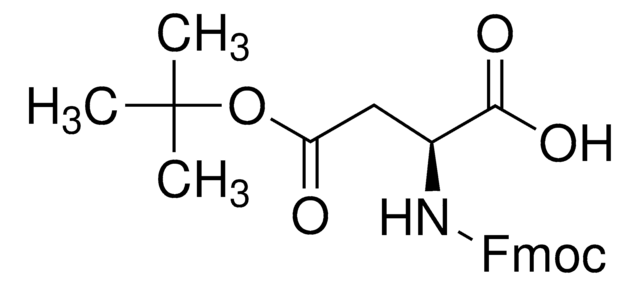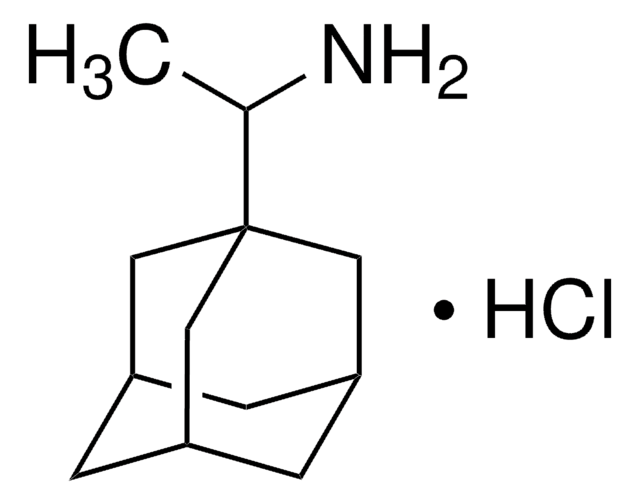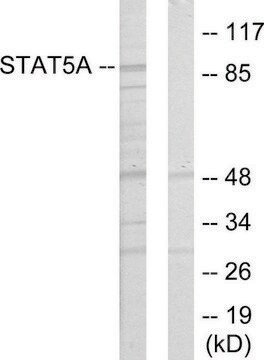MABS1180
Anti-E3 ubiquitin-protein ligase UBR1 Antibody, clone 6H9.1
clone 6H9.1, from mouse
别名:
EC: 2.3.2.27, N-recognin-1, RING-type E3 ubiquitin transferase UBR1, Ubiquitin-protein ligase E3-alpha-1, Ubiquitin-protein ligase E3-alpha-I
登录查看公司和协议定价
所有图片(2)
About This Item
分類程式碼代碼:
12352203
eCl@ss:
32160702
NACRES:
NA.41
推荐产品
生物源
mouse
品質等級
抗體表格
purified immunoglobulin
抗體產品種類
primary antibodies
無性繁殖
6H9.1, monoclonal
物種活性
human, rat
包裝
antibody small pack of 25 μg
技術
immunohistochemistry: suitable (paraffin)
western blot: suitable
同型
IgG2aκ
NCBI登錄號
UniProt登錄號
目標翻譯後修改
unmodified
基因資訊
human ... UBR1(197131)
rat ... Ubr1(499877)
一般說明
E3 ubiquitin-protein ligase UBR1 (UniProt: Q8IWV7; also known as EC: 2.3.2.27, N-Recognin-1, RING-type E3 ubiquitin transferase UBR1, Ubiquitin-protein ligase E3-alpha-1, Ubiquitin-protein ligase E3-alpha-I) is encoded by the UBR1 gene (Gene ID: 197131) in human. E3 ubiquitin-protein ligase UBR1 is a component of the N-end rule pathway. It recognizes and binds to proteins bearing specific N-terminal residues that are destabilizing according to the N-end rule, leading to their ubiquitination and subsequent degradation. It may also be involved in pancreatic homeostasis. Two isoforms of UBR1 have been described that are produced by alternative splicing. UBR1 is broadly expressed protein with highest levels reported in skeletal muscle, kidneys, and pancreas. UBR1 has two zinc finger domains. The UBR-type domain is localized to amino acids 97 to 168 and it forms a pocket that mediates recognition of type 1 N-degrons. It exhibits preference for arginine in first position and displays poor affinity for histidine. The second zinc finger domain, RING-type, atypical, is localized to amino acids 1098-1201. Mutations in UBR1 gene are causative factor in Johanson-Blizzard syndrome that is characterized by congenital exocrine pancreatic insufficiency, malformations such as nasal wing aplasia, and mental retardation.
特異性
Clone 6H9.1 detects E3 ubiquitin-protein ligase UBR1 in human and rat cells. It targets an epitope within 101 amino acids from the internal region.
免疫原
GST/His-tagged recombinant fragment corresponding to 101 amino acids from the internal region of human E3 ubiquitin-protein ligase UBR1.
應用
Anti-E3 ubiquitin-protein ligase UBR1, clone 6H9.1, Cat. No. MABS1180, is a mouse monoclonal that detects E3 ubiquitin-protein ligase UBR1 and has been tested for use in Immunohistochemistry (Paraffin) Western Blotting.
Immunohistochemistry Analysis: A 1:250 dilution from a representative lot detected E3 ubiquitin-protein ligase UBR1 in human pancreas and human kidney tissue sections.
Western Blotting Analysis: 0.5 µg/mL from a representative lot detected E3 ubiquitin-protein ligase UBR1 in C6 cell lysate.
Western Blotting Analysis: 0.5 µg/mL from a representative lot detected E3 ubiquitin-protein ligase UBR1 in C6 cell lysate.
Research Category
Signaling
Signaling
品質
Evaluated by Western Blotting in HEK293 cell lysate.
Western Blotting Analysis: 0.5 µg/mL of this antibody detected E3 ubiquitin-protein ligase UBR1 in HEK293 cell lysate.
Western Blotting Analysis: 0.5 µg/mL of this antibody detected E3 ubiquitin-protein ligase UBR1 in HEK293 cell lysate.
標靶描述
~200 kDa observed; 200.21 kDa calculated. Uncharacterized bands may be observed in some lysate(s).
外觀
Protein G purified
Format: Purified
Purified mouse monoclonal antibody IgG2a in buffer containing 0.1 M Tris-Glycine (pH 7.4), 150 mM NaCl with 0.05% sodium azide.
儲存和穩定性
Stable for 1 year at 2-8°C from date of receipt.
其他說明
Concentration: Please refer to lot specific datasheet.
免責聲明
Unless otherwise stated in our catalog or other company documentation accompanying the product(s), our products are intended for research use only and are not to be used for any other purpose, which includes but is not limited to, unauthorized commercial uses, in vitro diagnostic uses, ex vivo or in vivo therapeutic uses or any type of consumption or application to humans or animals.
未找到合适的产品?
试试我们的产品选型工具.
儲存類別代碼
12 - Non Combustible Liquids
水污染物質分類(WGK)
WGK 1
閃點(°F)
Not applicable
閃點(°C)
Not applicable
我们的科学家团队拥有各种研究领域经验,包括生命科学、材料科学、化学合成、色谱、分析及许多其他领域.
联系技术服务部门







